Table of Contents
About the Organization
The Problem
Dominant approaches to digital technologies are steeped in ideologies of market fundamentalism, and have displaced the cornerstone ethics of participation, social justice, and gender equality.
How We're Different
At IT for Change, we believe that progressive development sector actors must come together to influence the techno-social structures that are redefining our societies. We seek to build bridges across different sectors to strive towards a digital society that is equitable.
What We Do
Our work, straddling Data and Artificial Intelligence (AI), Big Tech and Digital Economy, the Digital Public Sphere, Feminist Digitality, Education and Technology, and more, pushes the boundaries of theory and practice to explore new horizons for development justice.
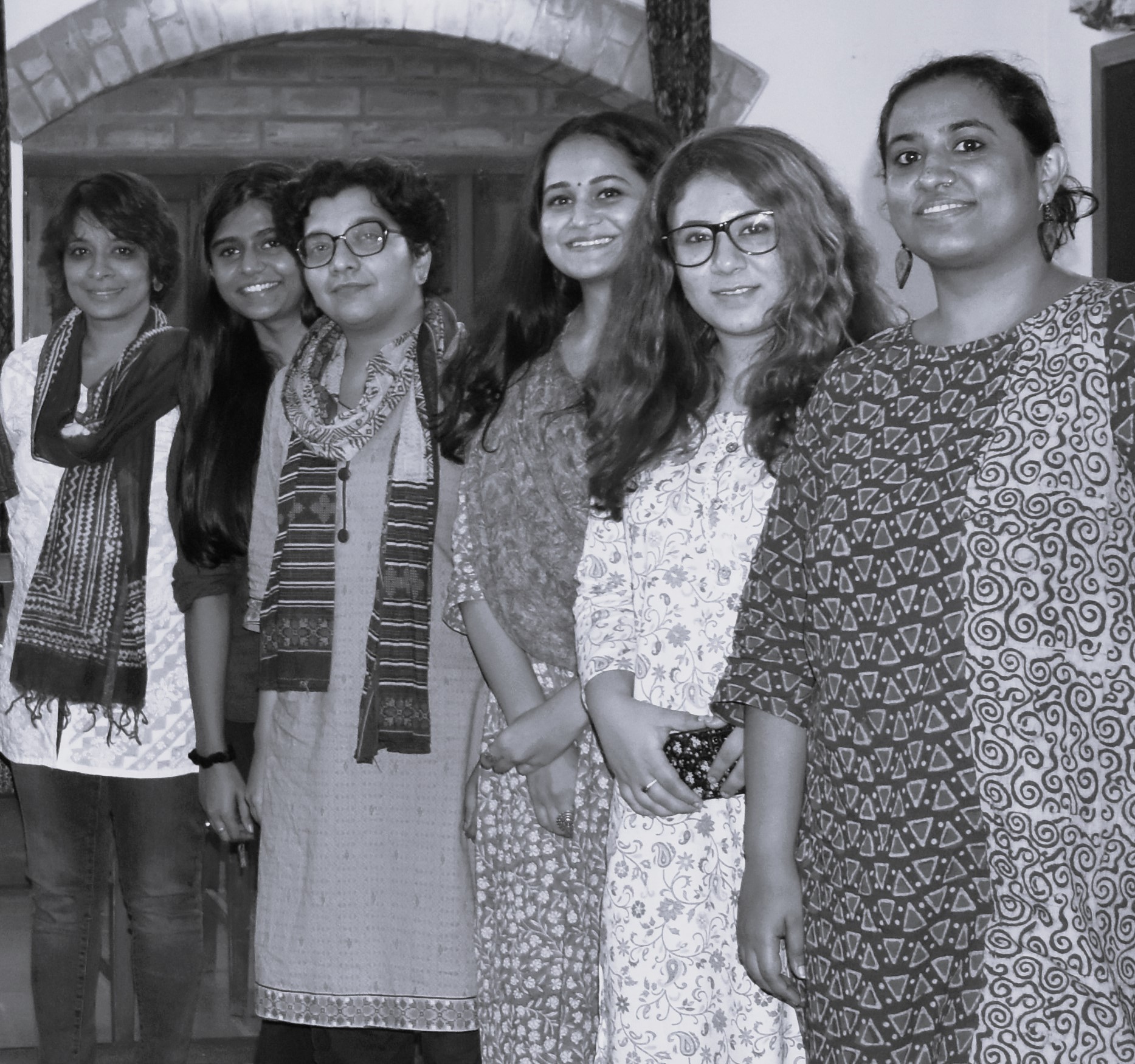
Democratizing the control and use of digital technologies so that individuals and communities are able to use them freely towards their empowerment.
A society in which digital technologies contribute to social justice and equality.
Equity, Social Justice, Gender Equality, and Democracy
- Partnering with local communities
- Forging local and global networks
- Undertaking research
- Engaging with policy spaces
- Creating new institutional capacity
A Note from the Team
As a yearly ritual and a critical organizational public function, the development and publication of the annual report is always a time of reflection here at IT for Change.
It provides the necessary room to step back and take stock of our journey so far, to assess the progress we have made during another year at the front-lines of digital justice, and importantly, to evaluate and confront with bare honesty all that remains to be done. While Covid-19 is a continuous presence in the backdrop, the world has cautiously emerged from the chokehold of the pandemic. From weathering the second and third waves of the pandemic to returning to on-site work, in-person events, field work, and even global travel and networking, the year has been challenging and hopeful for the world at large, and the IT for Change team in many ways.
We have continued to further the digital justice agenda at global and local levels, throwing ourselves into an ever-growing roster of research projects and initiatives, engaging with emerging focus areas, and forging new partnerships, while strengthening old ones. We continue to grow our impact in the developmental sector by influencing techno-social changes and policymaking in our thematic areas of work, moving towards supporting inclusive, egalitarian, and just policy frameworks — from the grassroots to the highest echelons of international rule-making. An uncompromising standpoint, based on intersectional feminist values and substantive equality, has always informed this tapestry of work.
This year, we have been part of key flashpoint victories, campaigns that we led or threw our weight behind. We have also seen the rewards of years of work galvanize into global agendas, gaining wider traction. Across these endeavors, we recognize that our work strengthens and is strengthened by the energies of a larger set of actors, feeding into instances of impact.
We capture in our annual report for the year 2021-22, the high notes of these efforts. We have distilled innumerable hours of knowledge production, field work, community engagement, and local-to-global advocacy undertaken by the 50+ members of the IT for Change team into a short reflective narrative. Whether you are an old friend of the organization, or a new partner, we invite you to engage with our report and get to know us and our work better.
We commit to continue our efforts — with an eye on the future — building our internal capacity to further our vision and strong legacy. Some of the main planks of our work in the coming year include continuing the important fight against Big Tech, co-shaping a global movement to democratize global digital cooperation, incubating a viable communitarian use case for AI in education, developing legal-institutional responses to gendered hate speech, and reclaiming labor rights in the digital paradigm.
In Solidarity,
The IT for Change Team
Our Impact
1
At the Forefront of the Battle against the Transnational Digital Corporation
As the pandemic laid bare the excesses of digital capitalism and the attendant regulatory deficits that entrench the status quo, a notable discursive shift has occurred in the public consciousness. The consensus is that Big Tech simply can’t be allowed to get away any longer. In this regard, a growing wave of regulation that seeks to make corporations more accountable is only a welcome first step. What is missing from this conversation, and indeed, rendered invisible, is the ever-increasing influence of the private sector in rule-making in the digital space. This has the disastrous consequence of eroding public interest and undercutting economic justice.
The need of the hour is to take on the question of what kind of governance can set right this hollowing out of publicness. This is why our research and advocacy focus on driving a stake through the heart of unchecked market power by unraveling the assetization of data — a priceless social resource of our time. We have gone on to bat for distributive justice in the digital economy, calling out the reversal of labor gains and the need for updated standards for decent work.

This year, we worked to stop a Big Tech takeover in its tracks. Twice.
We pushed back against the privatization of India’s digital finance backbone through a campaign with the State Bank of India’s employees’ union, and UNI Global, a global union federation for the skills and services sectors, against the proposal of the Reserve Bank of India (RBI) to create New Umbrella Entities (NUEs). This plan would have allowed private entities to create parallel and for-profit digital payment platforms, to the detriment of the existing public payment standard. Following our letter and widespread media coverage in August 2021, the RBI put its plan on hold. Read our campaign letter, covered by nine media outlets.
We prevented Meta from gaining backdoor access to WhatsApp user data by joining the efforts of a global civil society campaign against WhatsApp’s proposed policy in April 2021. The move would have given Meta, as the parent company, unparalleled control over the user data of millions who use WhatsApp, especially in the Global South. Facing pressure from policymakers, civil society, and users at large, Meta rolled back this decision.
We took the fight against multistakeholderism to Davos and beyond.
Through the Just Net Coalition (JNC) and the People’s Working Group on Multistakeholderism (PWGM), we made several efforts to challenge the brazen hold of Big Tech over global digital governance, all in the name of stakeholderism, a devious ploy to dislodge democratic modalities of rule-making. To counter the glib narratives of the World Economic Forum (WEF) on industry 4.0, we also analyzed Big Tech’s takeover of digital governance in a book published by the PWGM and released in January 2022 at an event attended by Jeremy Corbyn.
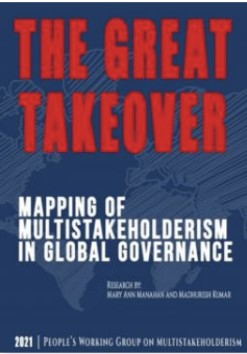
View this powerful video statement (at 00:52 mins) made by us at the UN General Assembly’s third thematic consultation on the ‘Our Common Agenda’ report.
Our consistent call for platform accountability on online sexism and misogyny is gathering global momentum.
Our joint submission with InternetLab was the only civil society submission cited by the UN Special Rapporteur (SR) on the Right to Freedom of Speech and Expression in her July 2021 report to point to the failure of social media behemoths to address online misogyny and cultures of gender-based violence with “the urgency, seriousness and resources it requires”.
We co-organized a panel with the UN SR’s office at the Internet Governance Forum (IGF), December 2021, bringing to the table representatives from the Government of Mexico, the Council of Europe, and the public policy wing of Meta, for a dialogue on the duty of care vested in platform companies to tackle sexist hate.
We have been one of the few civil society organizations straddling engagement with private platform companies (in particular, Meta) for a techno-design overhaul and advocacy in key UN forums — consultations of the UN Office of the United Nations High Commissioner for Human Rights (OHCHR) on Big Tech’s human rights obligations and Generation Equality Action Coalitions of UN Women.
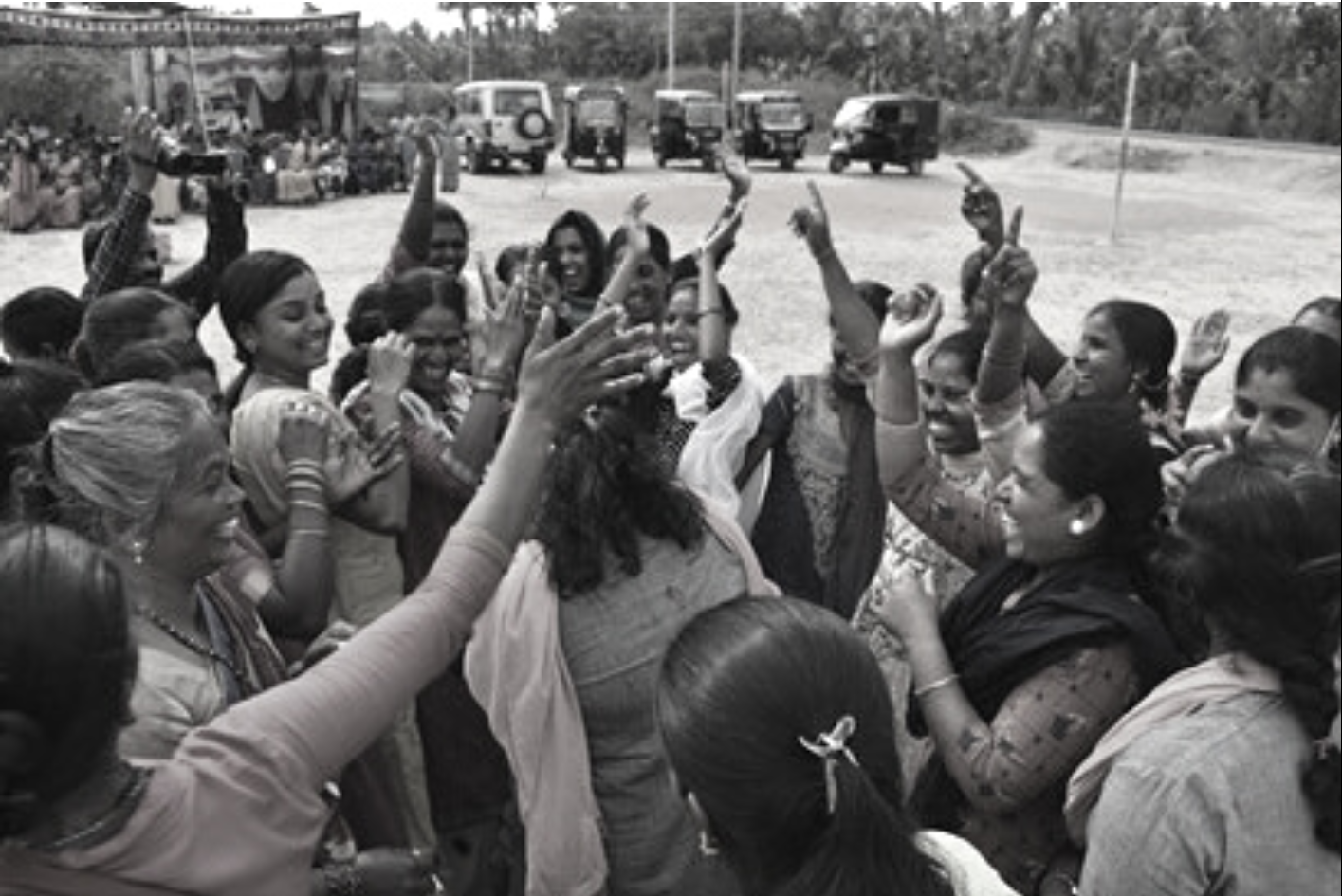
Using the tools of quantitative and qualitative research about women’s online participation, we have built a formidable body of evidence that informs our unequivocal demand for a binding multilateral framework as a basis to regulate social media and revitalize digital democracy and the feminist public sphere.
And…we’re sharpening the critique on Big Tech issues with a clear agenda to decolonize the digital.
A first-of-its-kind media initiative from IT for Change, we launched our monthly newsletter, DataSyn, dedicated to providing concise and relevant analysis on Big Tech issues. We went live in October 2021, with a debut issue that looked into the Chinese response to Big Tech control, and haven’t looked back since. Over the months, we have covered a host of issues including Big Tech’s growing hold over internet infrastructure, fintech, food systems and digitalization, and labor in the digital economy. Our year-end issue featuring 21 key voices reflecting on the struggles against Big Tech in 2021 is a feat that we are particularly proud of. DataSyn’s readership spans academics, policy professionals, and activists. We have been able to instrumentalize the essays from DataSyn toward various advocacy initiatives.
DATASYN AT A GLANCE
| 6 | issues |
| 30+ | contributors |
| 2700 | loyal readers |
| 50% | opening rate |
| 10+ | countries reached |
| 9225+ | new readers on Bot Populi |
FYI:
The piece ‘Assetization of Social Life’ by scholar Kean Birch, commissioned as part of efforts around the WEF annual forum in January 2022, has been our most-read DataSyn piece to date.
2
Shaping Public Digitalization Pathways for the South
An extractive digital economy has created a gaping data-divide among countries, manifesting and deepening global inequality. With our institutions and systems steadily getting datafied, public infrastructure and services like education and health are rapidly becoming integrated with transnational digital value chains. It is more important than ever before for people and nations of the Global South to reclaim their data and digital infrastructure. This calls for checking geoeconomic and geopolitical power in the digital space, and relocalizing the gains of the digital in a sustainable and equitable manner. The de facto control of the technology corporation over people’s destinies must make way for bold public policy models
Our collective future hinges on an expanded ideal of human rights — one that places human agency and collective democratic will in relation to the digital condition. This year we have made important strides in building the alternative narrative to the mainstream; collaborating with civil society actors, researchers, and trade union activists; and contributing to public policy processes. From working to preserve policy space and data sovereignty in digital trade agreements, furthering workers’ rights over data, to promoting conceptual frameworks on the data commons, and equipping governments from the Global South in their policy development on data and AI, we have used various routes to shape a new institutional vision of digitality.

We enshrined ‘community data’ as a concept in discourse, policy, and practice.
We have been successful in seeding the idea of community data, where data rights are vested in communities, as well as a data semi commons approach that deters free riding by Big Tech, in academic discourse and policy debate. Through our research, as well as at various national and global forums, we have evangelized thinking around this with academics and researchers. Through involvement in Government of India committees, we have been able to push for its inclusion in the Indian draft law framework on non-personal data.
We have also embarked on models that can demonstrate ideas for alternative data and community-led models in practice. With one state government in India, we are exploring alternative public-supported platform models. We have been working with SEWA Cooperative Federation and other organizations to assess how public policy frameworks can be developed through platform cooperativism and alternative platform economy employment models, based on worker collectives.

In January 2022, we also entered into an exciting partnership with the Department of Education, Government of Kerala. We are building a community AI model for learning to deploy alternative techno-design built on decentralization of data architectures and federated decision-making to ensure local-level control over the generation of data-based intelligence and its deployment in decision-making.
We furthered the digital industrialization agenda for the Global South.
Our longstanding contributions to the UN Conference on Trade and Development (UNCTAD) and the South Centre have been crucial in putting the agenda of digital sovereignty front and center in global policy discussions. At the 15th quadrennial session, the Ministerial Declaration of G-77 group of developing countries invoked the idea of ‘digital industrialization’, a concept we have pioneered. Another key agenda-setting opportunity has emerged through our participation in the UN Secretary General’s 10-member expert group on technology facilitation. We worked to ensure that the notion of ‘global digital public goods’ received its due in the UN Science, Technology and Innovation (STI) Forum in May 2022.
Read our policy briefs prepared for this forum, expected to form a part of the official background report to the UN STI Forum.
We provided the compass for economic justice in AI governance dialogues.
In August 2021, the Paris Peace Forum, an initiative of the French government, invited us to join a working group with leading academics, technologists, civil society members, and activists from across the world to develop a roadmap to bridge North-South concerns in AI governance. As part of the writing committee, we drafted a working paper, catalyzing a rich debate and building consensus around the need for a new AI governance approach to tackle not only the issues of AI bias and discrimination, but also the skewed distribution of data and AI resources in the global economy. Engage with the report’s key findings.

 We mainstreamed the idea of workers’ economic claims over their data.
We mainstreamed the idea of workers’ economic claims over their data.
We have consistently argued that workers’ data rights must be seen to include not only freedom from dataveillance and exploitative forms of algorithmic management, but also their claims over the data value they generate in the laboring process. Once a fringe concept, this idea of the economic value of workers’ data, and indeed, the right of workers to the same, is now increasingly gaining wider acceptance. We are proud to have worked with major union federations, including the International Trade Union Confederation (ITUC) and Public Services International (PSI) in this regard, and happy to report that the International Labour Organization (ILO) governing body in 2021 recognized the concept of workers’ data rights, and has tabled the issue to be discussed in the 2022 International Labour Conference.
Read our briefing paper to the ILO.

We also co-created a data justice agenda for labor.
We mobilized different constituencies committed to labor issues in the digital economy to come together on a pan-Indian civil society (CS) platform, paving the way for a coordinated civil society response to India’s evolving policy context.
Read our issue brief that analyzed the impact of the pandemic and associated lockdowns on platform workers in India.
Check out ‘A Civil Society Agenda for E-Shram’, which outlines a broad set of recommendations to strengthen the design and implementation of the online social security system for workers.
We continued to fiercely advocate for public safeguards to people’s data.
Our vigilance around emerging data policies in India has ensured that a discourse on the need to protect people’s data from corporate capture has steadily gained ground. When the Government of Karnataka announced its deeply flawed Draft Open Data Policy framework without public consultation, we swung into action and raised a range of concerns around the policy. Our timely intervention in the press was instrumental in forcing the state government to revisit its policy, with the Additional Secretary for e-Governance coming out with a public statement to allay concerns about Big Tech capture of public datasets. Read our op-ed in the Deccan Herald.
We have made inroads into tech-design policies of national data infrastructure.
We are working closely with the developers of the new digital information system for the National Rural Livelihood Mission (NRLM) and its women-led Self-Help Groups (SHGs). Our recommendations argue for more than just design activism, underscoring the role of policy and institutional choices. We are pleased that the National Mission Management Unit (NMMU) has taken cognizance of our inputs and concurs with us on the need for a data governance policy that recognizes the rights of the SHGs to co-determine decisions on their data.
3
An Important Bridge between Digital Justice and Development Justice
The political economy of development in the 21st century is predicated on the trajectory of digitalization — the manner in which institutions can evolve to meet the imperatives for an equitable and just digital paradigm. Big Tech and its mutations in the form of Big Agri, Big Pharma, and Big Retail divest people of their control over material and knowledge resources, undercutting local economic autonomy and shrinking the policy space for developing countries to reimagine the digital society and economy. Indeed, there can be no development justice without digital justice. Well aware of this connection, social movements and global civil society at the forefront of various struggles have begun expanding their repertoire to incorporate the digital sub-text in their critiques and strategies.
We are humbled that many organizations making this shift have turned to us with the faith that we can bring synergies by making the relevant data and digital connections to the work they do. These partnerships have matured into working groups, activist teach-ins, practitioner institutes, and programming roadmaps focusing on priority actions for a fair, just, and equitable global digital order. We have also had the opportunity to advise and input into the organizational thinking, agenda, and programming priorities of philanthropic foundations, as well as academic networks of the North working in solidarity with the South.
We worked with global civil society to connect the development and digital justice dots.
Forging strong partnerships with global organizations and social movements in health, food sovereignty, biodiversity, education, global trade, and finance, we have challenged the neo-colonial logics of data extractivism in international policy debates, bridging digital rights activism with development justice advocacy.

- The health data governance principles that we developed with Transform Health, a global initiative that works to further the universal health goal of the Sustainable Development Goals (SDGs), are a pathbreaking contribution to the data governance debates at the World Health Organization (WHO).
- Our work with the ETC group has deepened the conversations on food, data, and justice, pushing against the takeover of agriculture value chains by large transnational corporations, and arguing for a people-led digitalization.
- Collaborating with the Third World Network has given us the opportunity to provide strategic inputs on how Digital Sequence Information (DSI) flows need to be governed in the public interest, in the age of synthetic biology. The DSI question is a cross-cutting issue of pertinence to global governance fora such as the Biodiversity Convention, the WHO’s work on genomic sequencing, the Food and Agriculture Organization’s (FAO) mandate on the Seed Treaty, and more.
- We have been chosen by Oxfam to lead a critical study on mapping investments by the International Finance Corporation, a sister organization of the World Bank, in India’s burgeoning ed-tech sector, a study that we hope will pave the way for a sustained campaign in India.
- We continued to work closely with the Our World is Not for Sale (OWINFS) network, co-leading the civil society offensive to expose the machinations of the big powers on the e-commerce agenda, in the lead-up to the World Trade Organization (WTO) Ministerial Conference-12. Data governance issues — we have held — are not to be conflated with trade rules.
- Linking up with the Civil Society Mechanism on Financing for Development at the Friends of Monterrey retreat and UN Financing for Development process has been a vital step to open the conversation on financing of digital infrastructures.
 We convened the first global network on feminist digital justice.
We convened the first global network on feminist digital justice.
In partnership with DAWN, a leading Southern feminist organization, we initiated a global working group inviting 20+ leading feminist scholars and practitioners from Asia, Africa, and Latin America to evolve a feminist vision for the digital economy. Weaving together issues of misrecognition and maldistribution rampant in data capitalism, our platform has made a unique contribution to feminist analysis. Through 15+ discussions in 2021-22, the group has evolved an issue paper and a set of principles on feminist digital justice that will feed into a campaign for feminist digital innovation at the Commission on the Status of Women-2023 (CSW), where digital technologies are part of the priority theme.
Also, see our efforts with Friedrich Ebert Stiftung (FES) on Feminist Digital Justice, and the wonderful publication — ‘The Deal We Always Wanted’ — that came out of our dialogues on global feminism.
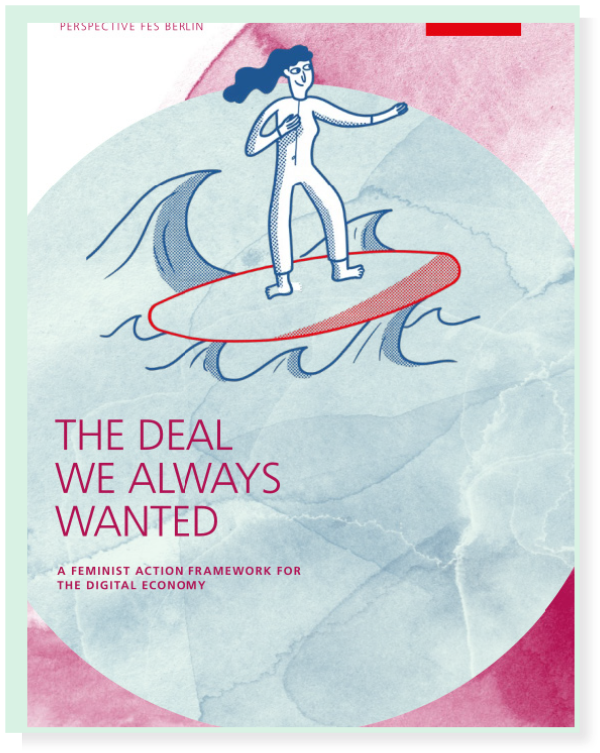
We are at the cutting-edge of naming how digitality is changing work and workers’ rights.
It would be no exaggeration to say that our theoretical and policy efforts have visibilized the need to account for algorithmic control as a new form of exploitation, and the idea of workers’ data rights as a vital agenda, in digitalized workplaces.
Our credibility in the space has been affirmed through various key partnerships, including with leading institutions like the ILO and philanthropic foundations like the Ford Foundation. To inform the directions of philanthropic effort on just futures of work, we successfully convened a series of dialogues with over 80 scholars, practitioners, unions, multilateral agencies, government representatives, and digital rights activists from across the world.
OUR PARTNERSHIP IMPACT FOOTPRINT
Work with 100+ CSO and think tanks
Spanning 20 countries
Collaborated 10+ education institutes
Supported 5 union federations
Supported by 10 funding agencies
Consulted by 15+ government bodies
Anchoring 15+ key networks
4
Forging New Models for Digital Citizenship
Connectivity does not automatically lead to meaningful inclusion in economic, social, and political life. The barriers to participation in the digital economy and society are socio-structural, arising as they do in historical power structures. Our field programs have undertaken the difficult work to address this through sustained interventions with the public education system, local government institutions, and marginalized communities.
We have co-constructed context-appropriate models of education and digital literacy that harness the emancipatory potential of digital technologies for the empowerment and participation of those rendered voiceless by the powers that be, also working with grassroots and public institutions to build capabilities for adaptation and transformation. Our commitment to community and institutional capacity-building has only deepened through these years of the pandemic.

We addressed the education emergency head-on.
The pandemic-triggered school closures in India have led to an alarming education deprivation, and loss in foundational abilities in languages and mathematics among school-going children, particularly those from low-income households. In 2021-22, our Centre for Education and Technology stepped up efforts to address this crisis. We facilitated the launch of the National Coalition on the Education Emergency (NCEE), bringing together educationists and civil society groups from eight states in the country to build social pressure on policymakers to reopen public schools on a priority basis.
Through research briefs, media op-eds, a “Back to School” campaign, and community engagement, the Coalition kept alive the ‘education emergency’ issue in public discourse.
In Karnataka, our efforts succeeded in persuading the government to advance the date for school reopening, and we also supported the Department of State Educational Research and Training to evolve appropriate guidelines for safe reopening of schools.
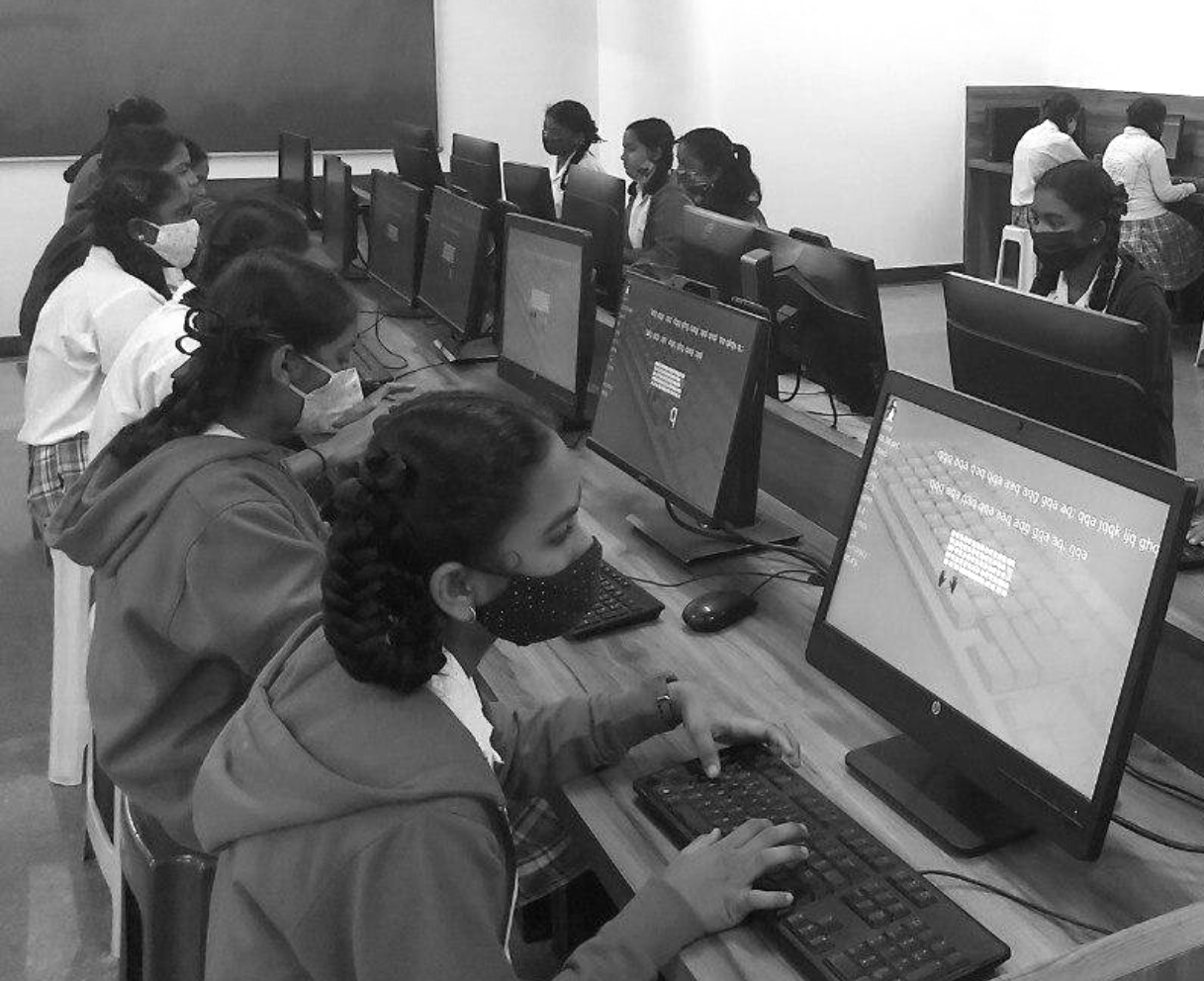
We convened 10 ‘Back to School’ camps with students from socio-economically marginalized communities to address the learning loss caused by prolonged school closures. Our efforts helped 750+ students, who had missed school for months, to return to structured learning, and 25 batches of teachers to navigate challenges of online teaching through open courses.
Our Prakriye Centre continues to be an enabler of rural women’s access to entitlements and services.
The pandemic years have seen acute distress in rural India, with disruption of public institutional services that have hit poor women the hardest. This year, through 37 gender helpdesks at the community-level, our team of trained para-counsellors provided support services to over 600 women survivors of domestic violence.
Our information centers helped process over 1,000+ welfare entitlement applications, also reaching 1,500 women members of Self Help Groups through media-supported learning forums. Women infomediaries of two centers rose to the occasion, collectivizing community members and mobilizing the local government to convene Pension Adalats (adjudicatory processes to respond to people’s pension-related grievances). Over 100 pension applications from 16 villages were successfully filed through this effort.
PRARKIYE IMPACT AT A GLANCE
| 1000+ | welfare entitlement apps processed |
| 1500 | women members of SHGs reached |
| 600 | survivors of DV supported |
| 100 | pension applications filed |
| 37 | gender helpdesks setup |
| 61 | villages reached |
Our Hosa Hejje, Hosa Dishe (New Steps, New Directions) team filled a critical gap – reaching out to over 600 girls in Bengaluru city through FM radio.
During the pandemic-related school closures, we initiated a 30-minute FM radio program, ‘Nan Voice Nan Choice’ (My Voice, My Choice), to continue our work with adolescent girls, supporting their empowerment journeys on a virtual platform. Since our in-school girls’ clubs were not possible to organize in this period, the radio program was a timely innovation, using a range of innovative formats — expert interviews with feminist counsellors, teachers, activists, and mental health professionals; a fictionalized mini-serial on adolescent girls’ challenges for self-actualization; and inspirational stories of girls who broke barriers — in order to communicate and reinforce a feminist narrative about adolescence. Girls from marginalized social backgrounds enthusiastically participated in the brainstorming and content development. Over 600 girls were reached through this program and the audio bank of content will be taken to schools across the state in the coming year. Give the program a listen.
![]() Nan Voice Nan Choice was one of my favorite programs during the Covid-19 pandemic. It was educational, entertaining, and motivating for not just adolescent girls, but all listeners in general. Each episode delivered a strong message, and the program espoused values such as cooperation, mutual respect, overcoming prejudiced mindsets,”
Nan Voice Nan Choice was one of my favorite programs during the Covid-19 pandemic. It was educational, entertaining, and motivating for not just adolescent girls, but all listeners in general. Each episode delivered a strong message, and the program espoused values such as cooperation, mutual respect, overcoming prejudiced mindsets,”
— Dr. Umashree, one of our regular viewers, was all praise for the program, terming it as a “morale booster during the pandemic.”.
Thematic Highlights
Retreat Diaries
With the cautious return to on-site work and in-person activities this year, we worked to create opportunities for building camaraderie among colleagues and recreating our sense of community after an extended period of remote work. You can find a full list of our colleagues here.
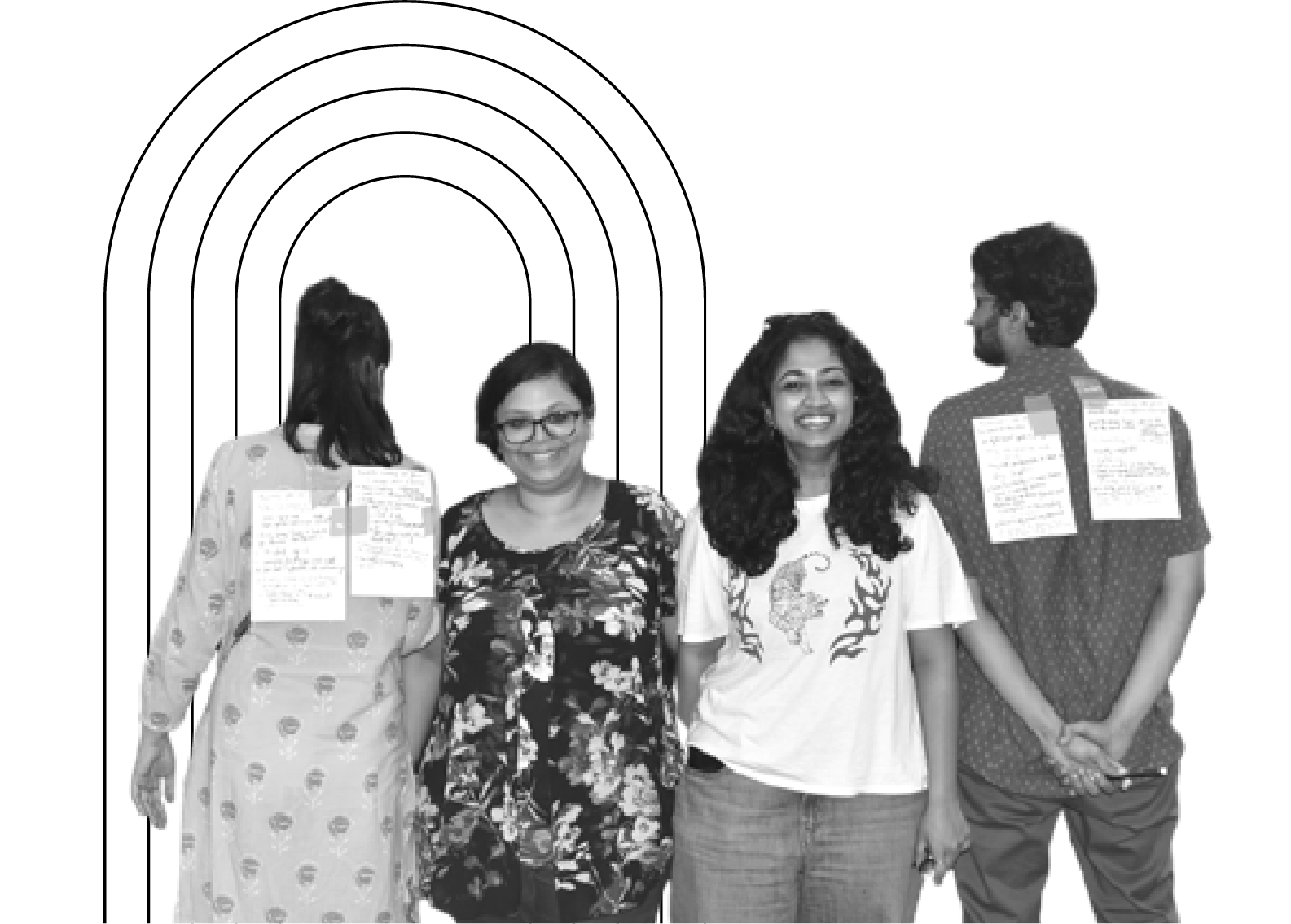
In October 2021, the program and education teams took a one-day trip to Guhantara, on the outskirts of Bengaluru for a well-earned day of leisure, and team-building. The education team also convened reading sessions to reflect and rethink on their pedagogic practices through the year and aid planning for the coming year. Articles such as the ‘Origins of India’s Textbook Culture’ by Prof. Krishna Kumar, former Director of NCERT, were read and discussed in detail as part of this initiative.
The Research and Advocacy team, scattered across different parts of the country, gathered in Bengaluru in May 2022 for a three day retreat at the Fireflies Intercultural Center. The intense program helped the team undertake a systematic, review, and feedback for the team members working on our flagship research projects. The retreat was also a great space for the team to connect, deepen their rapport and re-establish a common commitment to the organizational goal and vision.
Event Highlights
In the past year, we have been involved in key global policy events, have convened critical roundtables and institutes, and been invited to conferences and webinars to contribute key messages on digital justice in its many forms. Here are some highlights:
Socializing Data Value: How Can Data Governance Meet the Challenge?
11-12 MAY 2021, ONLINE
A core focus of IT for Change’s work has been exploring institutional governance frameworks for data that can democratize value creation and distribution. As part of this effort, we hosted a virtual global strategy roundtable, which brought together a select group of leading scholars, scholar-activists, and practitioners. The roundtable, co-organized with Friedrich Ebert Stiftung, explored the contestations characterizing the current economy and its data (dis)order, existing
and emerging governance responses, policy visions, and alternative practices that seek to socialize data value.

Tune into the session recording.
IT for Change at the WTO Public Forum 2021
30 SEPTEMBER-2 OCTOBER 2021, GENEVA
At the World Trade Organization Public Forum 2021, in collaboration with global civil society actors, we convened and participated in two sessions on data flows, e-commerce, and global trade. Our inputs, made by Parminder Jeet Singh at these panels focussed on the data sovereignty of the Global South and how digital trade and data laws can be designed for inclusion and poverty reduction. We also looked at the role of bodies such as the WTO in achieving this goal.
IT for Change at UN Internet Governance Forum
6-12 DECEMBER 2021, POLAND/ONLINE
At the Internet Governance Forum, a global multistakeholder platform that facilitates the discussion of public policy issues pertaining to the internet, Anita Gurumurthy, denounced the moves by the UN Secretary-General to promote pro-Big Tech multistakeholderist global governance arrangements in the guise
of a Global Digital Compact. She took part in the Main Session on Digital Cooperation - Quo Vadis. We have also been furthering this critical perspective on the multistakeholder capture of the digital governance conversation at the UN in the People’s Working Group on Multistakeholderism.

IT for Change at CESI’s 11th Annual International Conference
17-19 DECEMBER 2021, ONLINE
Comparative Education Society of India (CESI), a premier national organization in the area of Education Research, organized its annual national conference in December 2021 on ‘Mapping Education during Covid-19’. Gurumurthy Kasinathan, convenor of CESI’s ‘Education and Technology’ research interest group was part of the panel discussion and two paper presentation sessions exploring the intersections of education and tech.
Institute on Feminist Perspectives on Digital Economy and Society
13-14 NOVEMBER 2021, ONLINE
Convened as part of IT for Change’s School for Digital Futures, this two-day virtual capacity-building institute for young feminists covered diverse topics such as the platform economy and macroeconomic shifts, and feminist agendas for policy in the digital economy and society. The institute also focused on addressing the critical issue of voice and claims-making in a platformized society.
Our Partners & Networks
We have worked with, and are associated with 100+ CSOs, academic institutions, union federations, private-sector entities, government and multilateral bodies across the globe. Here is a glance at our list of partners:
National
- Aapti Institute
- Bharatiya Krishak Samaj
- Breakthrough India
- Center for Health and Social Change
- Centre for Internet and Society
- Internet Freedom Foundation
- Oxfam India
- Tattle Civic Technologies
Asia-Pacific
- Asia Pacific Forum on Women, Law and
- Development
- ETC Group
- Focus on the Global South
- Third World Network
MENA
- Southern and Eastern Africa Trade Information
and Negotiations Institute (SEATINI)
US-Canada
- Centre for Innovation and Governance
- Web foundation
Europe
- The Centre for Research on Multinational
Corporations - Centre tricontinental
- Clean Clothes Campaign
- Food First Information and Action Network
- SINE Foundation
- Transnational Institute
- Whynot Lab
Latin America
- InternetLab
- Social Watch
Global
- Civil Society Group on Financing for
Development - Commonwealth of Learning
- People’s Health Movement (PHM)
- GRAIN
- International Trade Union Confederation
- International Transport Workers Federation
- Indian Federation of App-based Transport
Workers - Public Services International
- UNIglobal
- European Union
- International Labour Organization
- Karnataka Residential Educational Institutions Society (KREIS)
- Kendriya Vidyala Sanghatan (KVS)
- Kerala Infrastructure and Technology for
- Education, Government of Kerala
- Kerala Development and Innovation Strategic
Council, Government of Kerala - Ministry of Rural Development, Government
of India - National Human Rights Commission,
Government of India - NITI Aayog
- Paris Peace Forum
- South Centre (G-77)
- United Nations Conference on Trade and
Development - United Nations Science and Technology
Forum - UNWOMEN
- UN Special Rapporteur on the Freedom of
Expression
- Indian Software Product Industry Round Table
- LabourNet
- Sewa Cooperative Federation
- Vrutti
- A.T.E Chandra Foundation
- British Asian Trust
- British Telecom
- Bill and Melinda Gates Foundation
- Edelgive foundation
- European Commission
- Ford Foundation
- Friedrich Ebert Stiftung
- IDRC Canada
- Kotak Mahindra Bank CSR
- Omidyar Network India
- Access to Knowledge for Development
Centre, American University of Cairo - Center for Excellence in Teacher Education,
Tata Institute of Social Sciences - Institute of Development Studies
- London School of Economics
- Open Data Institute
- Regional Institute of English, South India (RIESI)
- The New School
- Tilburg University
- University of Melbourne
- University of Sao Paulo
- University of Manchester
Networks
We also anchor, and are closely involved in policy, advocacy and research networks on global digital justice issues. Here is a glance at the key networks we are part of:
APRCEM South Asia Working Group
Data Governance network
Development Alternatives with Women for a New Era
EdTech Watch
Fair Green and Global Alliance
Gender and Trade Coalition
Global Trade Justice Network
Global Partnership on Artificial Intelligence
Joint Action Committee Against Foreign Retail and E-commerce
Just Net Coalition
National Coalition on Education Emergency
Our World is not for Sale
People’s Working Group on Multistakeholderism (PWGM)
Platform Governance Research Network Right
Digitalisation Network
RTE Forum
Transform Health Coalition
Projects & Publications
The Essential IT for Change Reading List: 2021-22
ACADEMIC INSTITUTIONS
Data Subjects in the Femtech Matrix: A Feminist Political Economy Analysis of the Global Menstruapps Market. Feminist Digital Justice. DAWN and IT for Change
Nandini Chami, R. Vaishno Bharati, Anushka Mittal, and Ankita Aggarwal
FROM THE PRESS
The Crypto Assets Conundrum in The Hindu.
Parminder Jeet Singh
JOURNAL ARTICLE
The EdTech Leviathan in the Economic and Political Weekly
Gurumurthy Kasinathan and Amshuman
Dasarathy
EVENT REPORT
Socializing Data Value: Reflections on the State of Play, observations from a virtual roundtable.
Amay Korjan and Vinay Narayan
EVENT REPORT
Credit Scoring Algorithms as Tools for Financial Inclusion: A Development Perspective
Anuradha Ganapathy
FROM THE DATASYN VAULT
Time for Upgrade: Why Competition Law is Not Enough for the Platform Economy
Shreeja Sen
NOTES FROM THE FIELD
How Does Aadhaar Enabled Welfare Delivery Exclude Women?
Nayana Kirasur
POLICY BRIEF
Data Empowerment and Protection Architecture: Side-stepping empowerment for convenience?
Tanay Mahindru and Anushka Mittal
BLOG
A Feminist Social Contract for a New Digital Economic Future
Avantika Tewari
FORTHCOMING
State of Big Tech: Dismantling Digital
Enclosures.
IT for Change
The Indian Judiciary’s Tryst with Online Gender-
based Violence: An Empirical Analysis of Indian Case-law.
IT for Change
National Gender Fellowships on Gender and
the Digital Economy (Research papers and
long-form essays).
IT for Change
Right to Education in the Digital Society. (Book
chapter for Routledge).
IT for Change
Projects Overview
Centering Women in the Digitalizing Economy
(2020-2024)
Data Governance Network
(2019-current)
Fair, Green and Global (FGG) Alliance
(2021-2026)
- State of Big Tech Report
(2021-current)
- Digital Economic Integration of MSMEs in the Global South
(2022-current) - DataSyn Newsletter (2021-current)
Feminist Digital Justice
(2019-current)
Future of Rights and Citizenship in theDigital Age
(2020-2023)
Health Data as Global Public Good: Project for Foundation Botnar
(2020-current)
Hosa hejje Hosa dishe
(2019-2022)
Intelligent Infrastructures
(2021-current)
IT for Change under BUILD
(2021-2022)
Namma Maatu Namma Jaaga, Phase II
(2020-2023)
Recognize, Resist, Remedy
(2019-2022)
Reform the Gig: Research and Advocacy on Platform Workers’ Rights in India
(2020- current)
School of Digital Justice
(2022-current)
The Feminist Observatory of the Internet
(2020-current)
Towards Gender Just Public Information System Design
(2021-current)
Transforming School Education through ICT Integration
(2021-2022)
Financial Statements
BALANCE SHEET AS ON 31 MARCH 2022
All amounts are in INR
| 2020-21 | Liabilities | 2021-22 | % of total | 2020-21 | Assets | 2021-22 | % of total |
|---|---|---|---|---|---|---|---|
| 22,568,179 | Organisation Stabilisation Fund | 31,144,106 | 29 | 2,007,203 | Fixed Assets | 2,799,471 | 3 |
| 0 | Corpus Donation | 240,000 | 0 | 107,731,888 | Current Assets, Loans and Advances | 103,374,048 | 96 |
| 16,838,565 | General Fund | 21,680,345 | 20 | 860,408 | Receivables | 935,778 | 1 |
| 2,045,662 | Asset Fund | 2,799,471 | 3 | ||||
| 66,335,572 | Advance Account | 44,638,968 | 42 | ||||
| 2,811,521 | Sundry Payables | 6,606,407 | 6 | ||||
| 110,599,499 | Total | 107,109,297 | 100 | 110,599,499 | Total | 107,109,297 | 100 |
INCOME AND EXPENDITURE ACCOUNT FOR YEAR ENDED 31 MARCH 2022
All amounts are in INR
| 2020-21 | Expenditure | 2021-22 | % of total | 2020-21 | Income | 2021-22 | % of total |
|---|---|---|---|---|---|---|---|
| 26,886,613 | Personnel Costs | 37,257,090 | 60 | 32,202,006 | Funds Received | 51,848,396 | 83 |
| 4,383,942 | Operating Costs | 10,915,101 | 17 | 4,606,482 | Interest on Term Deposit & Savings Bank Account | 5,220,667 | 9 |
| 2,958,349 | Administration Costs | 3,268,931 | 5 | 798,475 | Income to the extent of Depreciation transferred from Asset fund | 1,043,553 | 2 |
| 798,475 | Depreciation | 1,043,553 | 2 | 388,141 | Withdrawal from Asset Fund | 38,459 | 0 |
| 3,638,063 | Excess of Income over Expenditure | 4,841,780 | 8 | 2,491,116 | Donation | 2,101,528 | 3 |
| 3,638,063 | Appropriation towards Organizational Expenses | 4,841,780 | 8 | 1,797,977 | Professional Fee | 1,888,598 | 3 |
| 19,308 | Interest on IT Refund | 27,034 | 0 | ||||
| 42,303,505 | Total | 62,168,235 | 100 | 42,303,505 | Total | 62,168,235 | 100 |
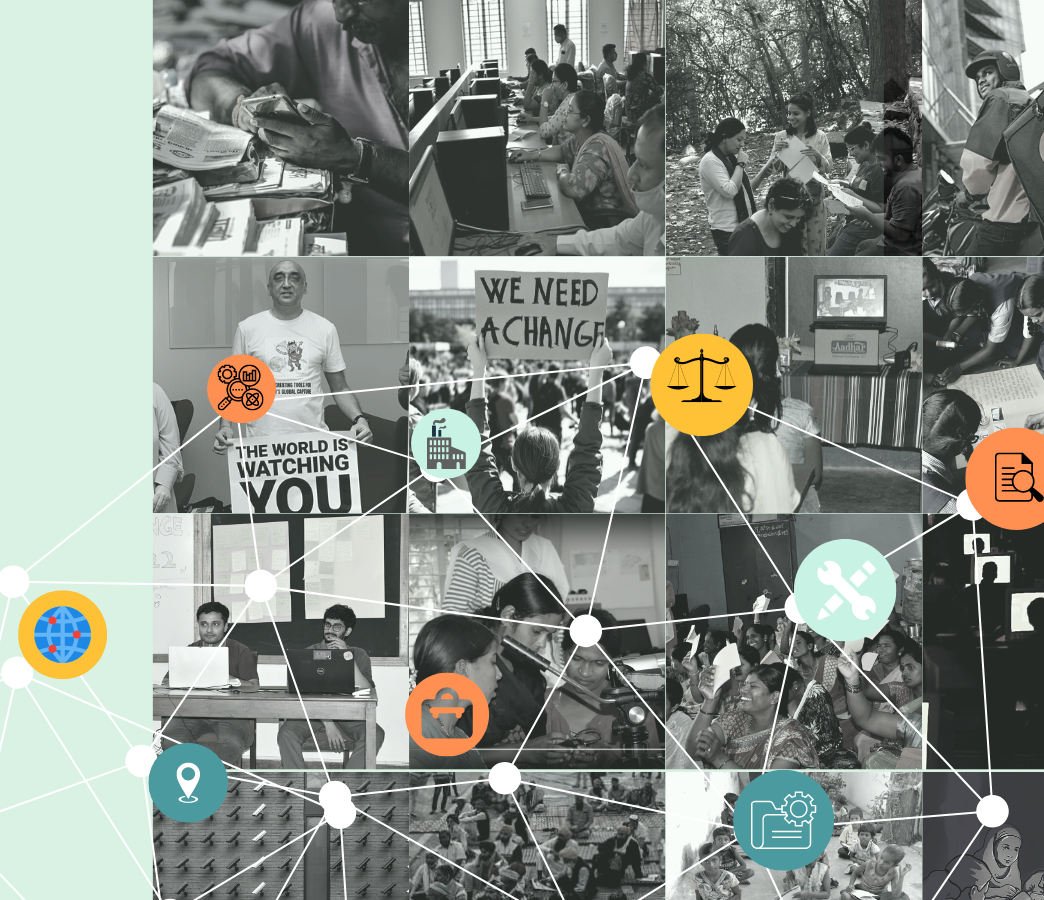



The IT for Change Social Report
Reflecting on our Organizational Growth
Impact Footprint
Our Work Out in the World